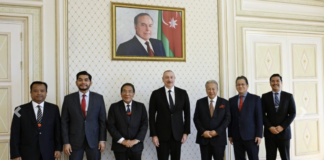KUALA LUMPUR, July 20 — Malaysia is bidding for a seat in the International Telecommunication Union (ITU) Council for Region E–Asia and Australasia said Deputy Communications and Multimedia Minister Datuk Zahidi Zainul Abidin.
He said Malaysia envisioned that ITU will be sensitive to the developmental needs of its members as well as responsive in coming out with fit-for-purpose strategies and action plans.
“The ITU will be innovative in offering solutions in addressing future challenges faced by its membership in this dynamic and fast-changing sector. Thus, we seek your support,” he said in his keynote address, via teleconferencing, in conjunction with the Asia-Pacific Telecommunity Policy and Regulatory Forum (PRF) which took place in Bangkok Thailand, yesterday.
In addition, he said Malaysia was planning to adopt a digital-native and cloud-first strategy to accelerate the digital transformation of the public sector.
Zahidi said the efforts were expected to see an upwards of 80 per cent usage of cloud storage in the government that would allow the use of Big Data, Artificial Intelligence (AI), the Internet of Things (IoT), and other emerging technologies.
“Malaysia will also improve its interconnection ecosystem infrastructure and national backbone to attract the setting up of data centres, internet exchange points, and international connectivity businesses to the country,” he said.
Zahidi said Malaysia was also looking at improving the quality of experience of internet coverage which would further drive down and narrow the digital divides between urban and rural populations.
He added that digital innovation and transformation were more than just rolling out enabling digital infrastructures as the major part of the initiative included equipping our citizens with future skills, closing the gaps between talent and demand, as well as future-proofing our human resources.
“In line with this, Malaysia has recently launched Malaysia Digital (MD) as the new national strategic initiative to accelerate the growth of the nation’s digital economy driven by three key principles, namely flexibility, agility, and relevance.
“The initiative envisions to drive digital adoption amongst aspiring young entrepreneurs, companies, and people; to grow local tech companies to be Malaysian champions, thriving globally; and to attract high-value digital investments,” said Zahidi.
Zahidi said MD was also aiming to drive digital adoption and opportunities in the digital economy via the Malaysia Digital Catalytic Programmes (PEMANGKIN) and other competitive offerings.
He is optimistic that the digital economy will be able to contribute 25.5 per cent to the country’s gross domestic product (GDP) by 2025.
















